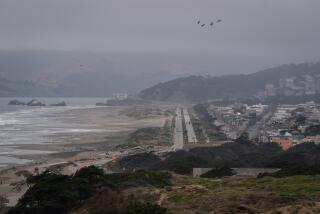Some of the Main Issues in Offshore Oil Dispute
- Share via
It was unfortunate that Interior Secretary Donald Hodel’s letter (Sept. 25) failed to address some of the main issues in the offshore oil dispute. The key question, for example, is not whether to extract our offshore oil but when and under what conditions.
The oil underlying our oceans will remain securely in place until we decide to go and get it. Certainly it takes time to find and develop it, but the law of supply and demand will surely make that oil more valuable in the decades ahead when we begin to reach the bottom of the nation’s (and the world’s) collective oil barrel. No one, Hodel included, has ever made a convincing case that the national interest (separate from legitimate but short-term corporate interests), would be enhanced by recovering and burning that oil now as compared to having it available later when there will be less of it and hence it will be more valuable.
Hodel uses words with a nice ring like “consultation and consensus” but ignores the plain fact that the consultation is not working and the consensus is obviously absent. The 4-year moratorium was clear evidence of this. But even if it were working, consultation is not enough. State and local governments, given their strong interests in this matter, need to be full partners with the federal government if offshore oil development is to proceed in a stable and predictable fashion.
Hodel also ignores the fact that residents of coastal communities such as Santa Barbara suffer impacts from state and federal oil platforms alike. For example, air pollution emissions from both sets of platforms and the activities associated with them have become very serious problems in many coastal communities to the point that they could foreclose the possibility of other types of economic development.
Federal and state oil agencies (the Minerals Management Service and the State Lands Commission) must get together with local communities and jointly determine the combined level of offshore activity that can be accommodated at any one time, given onshore air quality limitations and the meteorological situation.
Hodel’s conclusion that the 1978 Outer Continental Shelf Lands Act is handling offshore oil development in “an orderly and environmentally sensitive manner” is simply not borne out by the facts. Litigation has increased since 1978 and, with it, delay and uncertainty. Congress found it necessary to bypass the entire statute and use the appropriations process to stop the leasing process in areas off Massachusetts, Florida and California. And Hodel’s recent ill-fated effort to reach an ad-hoc leasing agreement with some of our congressional delegation was itself an example of going outside the established process.
Complex and detailed as the OCS leasing law is, it is inadequate in some of its key aspects:
--It allows the secretary of Interior far too much discretion.
--It does not give adequate voice to the legitimate concerns of state and local governments whose citizens are most directly affected by the adjacent offshore oil activity.
--It does not provide useful standards to assist the secretary of Interior in balancing national energy needs with adverse impacts that may occur on other ocean resources or uses or on inhabitants of the coastal zone.
Finally, Hodel does not explain the inconsistency between the continuing zeal for rapid offshore oil development and the Reagan Administration’s actions in backing away from other steps that would be equally effective in reducing our dependence on foreign oil--such as the 2-year postponement of the requirement for more fuel-efficient autos, the slowdown in filling the strategic oil reserve, and the cut-back in R & D funding for alternative energy sources.
The best remaining prospects for significant new oil and gas discoveries probably exist off the coasts of California and Alaska, the two regions of the country where conflicts over oil development are most intense and could worsen. Yet all of the affected interests in these struggles, including the oil industry, really want the same thing: stability in the process, predictability and fairness in the outcome. It seems obvious that the current arrangements are not working. The disarray and name-calling of recent weeks should provide the California congressional delegation with the ammunition needed to begin the much needed reform of the offshore oil leasing statute.
ROBERT W. KNECHT
Santa Barbara
Knecht is a former head of the federal coastal zone management program.
More to Read
Sign up for Essential California
The most important California stories and recommendations in your inbox every morning.
You may occasionally receive promotional content from the Los Angeles Times.










